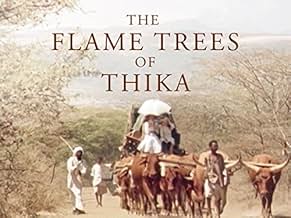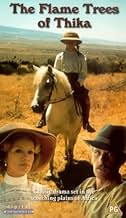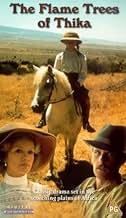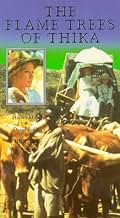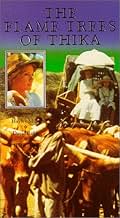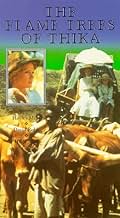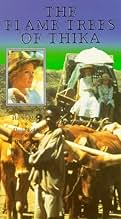VALUTAZIONE IMDb
7,8/10
477
LA TUA VALUTAZIONE
Aggiungi una trama nella tua linguaElspeth's family starts a Kenyan coffee plantation. She befriends locals and expats, experiencing nature's beauty and cruelty. An affair between Lettice Palmer and a safari guide runs parall... Leggi tuttoElspeth's family starts a Kenyan coffee plantation. She befriends locals and expats, experiencing nature's beauty and cruelty. An affair between Lettice Palmer and a safari guide runs parallel. World War I changes Elspeth's exciting life.Elspeth's family starts a Kenyan coffee plantation. She befriends locals and expats, experiencing nature's beauty and cruelty. An affair between Lettice Palmer and a safari guide runs parallel. World War I changes Elspeth's exciting life.
- Nominato ai 3 BAFTA Award
- 3 candidature totali
Sfoglia gli episodi
Recensioni in evidenza
To even think that this show is colonialist or smug towards Africans is completely ridiculous and insane at best.
The show couldn't be more positive towards Africans and negative towards white people.
This is one of these strangely manipulative but innocent looking guilt-trip-shows that are very popular in Germany or the USA.
Virtually all white people - besides 2 or 3 exceptions - are ignorant, patronizing and mean while virtually every African - besides 1 exception at best - is a good behaved hard worker.
The supposedly good will of the show doesn't just stop at the skin color of people.
It really likes to contrast super-capable, strong, confident (blonde) women with whiny, hysterical (dark haired) women.
In other words, the more noble the aim, the more pathetic the result.
I even doubt, however, the oh so noble and moral goal of the show. It just feels very wrong-headed and under-complex for the depth of it's topics.
The show couldn't be more positive towards Africans and negative towards white people.
This is one of these strangely manipulative but innocent looking guilt-trip-shows that are very popular in Germany or the USA.
Virtually all white people - besides 2 or 3 exceptions - are ignorant, patronizing and mean while virtually every African - besides 1 exception at best - is a good behaved hard worker.
The supposedly good will of the show doesn't just stop at the skin color of people.
It really likes to contrast super-capable, strong, confident (blonde) women with whiny, hysterical (dark haired) women.
In other words, the more noble the aim, the more pathetic the result.
I even doubt, however, the oh so noble and moral goal of the show. It just feels very wrong-headed and under-complex for the depth of it's topics.
Fabulous min-series making you wanting more. Magnificently shot capturing the wilds of Africa and the superstitions of its people. A story seen through the young eyes of Elspeth displays why these types of British mini-series are so wonderful even after almost 25 years to watch again and again. Great supporting performances by Haley Mills and Sharon Maughan lights up the storyline and it is a shame they did not continue the series onto the next Huxley autobiographical book. It was a pleasant surprise to see that Roy Ward Baker was also the director for one my favorite Titanic movies, 'A Night to Remember'. A bit of trivia that had escaped me all these years. If you enjoyed 'Out of Africa' by Dinesen, you will surely enjoy this series. The quality of the DVD and extras were less than stellar but it does nothing to diminish the beauty of the story, the acting, or the beautiful wilderness of Africa.
10emuir-1
I first saw the Flame Trees of Thika 40 years ago and had forgotten what a superb program it was. I just saw it again on Acorn TV and it is a real feast for the eyes. Made on location in Kenya with actors playing their own nationality, Scots playing Scots, Dutch playing South African Boers, and Kenyan actors and native tribespeople playing the Kenyans, and real wildlife (lots and lots of wildlife) . The location scenery is stunning and amost a travelogue for Kenya. Ben Cross, who passed away last year was in his 30's and ruggedly handsome as a horse trader/safari leader. The acting was top notch. Although set in the early 20th centurywhen Kenya was being colonised by aristocratic second sons and former military officers of the British empire, this is not The Happy Valley of White Mischief - more the second class settlers who are very hard working farmers struggling to establish coffee plantations and farm animals and doing the work themmselves, tatherr than appointing stewards. I plan to buy the DVD to keep on hand for when the series on no longer available on TV.
Unfortunately the first episode on Acorn does not have captions, and has an inferior picture, but I persevered and the subsequent episodes had both captions and a better picture. There is a disclaimer to the effect that certain scenes and lanaguage are counter to what is acceptable today and may offend some people. I don't know what was offensive - colonial rule in East Africa was what it was and we did not see any atrocities or brutalities carried out by the white settlers, nor was there any bad language or graphic sex, so the series could be enjoyed by the whole family.
Unfortunately the first episode on Acorn does not have captions, and has an inferior picture, but I persevered and the subsequent episodes had both captions and a better picture. There is a disclaimer to the effect that certain scenes and lanaguage are counter to what is acceptable today and may offend some people. I don't know what was offensive - colonial rule in East Africa was what it was and we did not see any atrocities or brutalities carried out by the white settlers, nor was there any bad language or graphic sex, so the series could be enjoyed by the whole family.
This is an intriguing curio from British television, based on the autobiographical novel by Elspeth Huxley. The story here sees young Elspeth (Holly Aird) travel out to East Africa with her parents Robin and Tilly Grant (David Robb and Hayley Mills) to set up a new life in the outback during the early 1910's. You sense this is more Robin's idea than a joint venture, but Tilly makes the most of the situation and gradually they build their home there and set up farm land. Soon after they acquire some neighbours, among them game hunter Piet Roos (Morgan Shepherd), Mrs Nimmo (Carol MacCready) and another young couple Hereward and Lettice Palmer (Nicholas Jones and Sharon Maughan), plus the arrival of an enigmatic young stranger in the shape of Ian Crawford (Ben Cross), a Safari guide. But life out in Kenya can be hard and desolate, with many dangers from wild animals, plus the strange customs and beliefs from the natives out there, which makes it all the more fascinating for young Elspeth as she adapts to life there.
I've described Flame Trees as a curio because that is what it is. It was made during a time when TV could just adapt and tell a story involving Brits during the colonization era without being tied up in issues about it's moral aspect. But in fact it gives a fair outlook on both sides of the issue here, with mentions on taking native land and one scene early on when Robin stops Piet Roos from whipping one of his workers to give him "a lesson he needs to learn." But it also doesn't shirk from the natives traditions or superstitions that also dogged their culture, such as one story involving one of the Grants' workers who takes to his bed after another has cursed him for being to blame for the death of his wife and child. As it is autobiographical it tells what it was like out there, not the sanitized version some people may like it to be, and along with the above mentioned it also shows the hardships, the loneliness for some, plus questions the ideas of going out to shoot animals just for "sport", which also leads to one scene where Elspeth admonishes Hereward Palmer for shooting a pregnant antelope, only to later be spanked by her father for refusing to apologize to him.
Elspeth is the main focus on which the story and incidents revolve. She is not always the cause of them, more an observer on life out there, the way the British behave and her fascination with the culture of the natives and her friendship with Njombo (Mick Chege), one of their African workers. Holly Aird is wonderful as Elspeth and carries the plot (such as it is) throughout it's seven episodes. Her innocence and curiosity is what carries this story, learning life lessons along the way, and being a child she is more willing to accept and explore the various native beliefs and superstitions. While some are just that, superstition, others are more spiritual and in one scene she is willing to accept a shaman to bless a baby antelope she has been given to protect it, whereas the adults would of just dismissed it as hocum. And her mother's attempts to be a nurse to the natives inspires her to do much the same with the local wildlife. In one episode she finds an injured pigeon, which she determines to nurse back to health. And the said mentioned antelope, bought as a present for her, often leaves you fearing for it's fate, such are the hazards of Africa. It doesn't sugar coat the reality of Kenya or the struggles to adapt and live out there.
It has to be said that not much actually happens in Flame Trees of Thika. There are incidents, such as Tilly working as a nurse for the natives, a native who believes he has been cursed and the family's attempts to break the native superstition to save him, the murder of a worker, plus the time Elspeth gets left with Mrs Nimmo when her parents go off somewhere and the wild party that occurs. The most prominent storyline involves the arrival of Ian Crawford (a captivating Ben Cross), who falls for the lonely and mentally unstable Lettice Palmer (a very good Sharon Maughan). Ian represents an escape from the loneliness of the outback and the coldness of her husband, who stubbornly refuses to go back. But it only serves to make her more fragile and unstable, not helped when one of her dogs gets killed by a leopard, leading to Hereward determined to track down and kill the leopard to placate his wife. Eventually the outbreak of World War One triggers a motion that breaks up the tranquility of the settlers' existence out there, as the men go off to fight and ultimately tragedy sees the families head back to Blighty. What is left is their experience of a life and culture they knew little about before, and memories of their life out there.
The most remarkable feature of this drama is the presence of Hayley Mills as Tilly Grant. Mills often found the transition from child star to adult career harder due to her breathy almost little girl voice and earnest way of acting, but here you don't notice that it's her. She adapts so well as Elspeth's mother that you just accept her in the role and it's easily one of her best adult performances. She is no shrieking violet when getting stuck into the hard work involved, nor is she scared about going on a hunt and getting close to danger or wild animals. It's a superb performance and deserves a lot of credit for creating a role of a woman just adapting to life out in Africa and all it throws at her. Overall, I found this drama interesting, with Mills in an unexpected role that she totally owns, but it's Holly Aird who is the undoubted star of this, due to being an innocent seeing things with unprejudiced eyes and her embrace of her new homeland. But it's also a strange drama in the fact that not much is actually concluded, and you are left with the feeling of not much actually having happened. It's an interesting curio which proved a big hit in 1981. But as much as I did enjoy it, there is little that lingers long in the memory - except perhaps the shimmering landscape of Kenya and a glimpse into their cultures of the time.
I've described Flame Trees as a curio because that is what it is. It was made during a time when TV could just adapt and tell a story involving Brits during the colonization era without being tied up in issues about it's moral aspect. But in fact it gives a fair outlook on both sides of the issue here, with mentions on taking native land and one scene early on when Robin stops Piet Roos from whipping one of his workers to give him "a lesson he needs to learn." But it also doesn't shirk from the natives traditions or superstitions that also dogged their culture, such as one story involving one of the Grants' workers who takes to his bed after another has cursed him for being to blame for the death of his wife and child. As it is autobiographical it tells what it was like out there, not the sanitized version some people may like it to be, and along with the above mentioned it also shows the hardships, the loneliness for some, plus questions the ideas of going out to shoot animals just for "sport", which also leads to one scene where Elspeth admonishes Hereward Palmer for shooting a pregnant antelope, only to later be spanked by her father for refusing to apologize to him.
Elspeth is the main focus on which the story and incidents revolve. She is not always the cause of them, more an observer on life out there, the way the British behave and her fascination with the culture of the natives and her friendship with Njombo (Mick Chege), one of their African workers. Holly Aird is wonderful as Elspeth and carries the plot (such as it is) throughout it's seven episodes. Her innocence and curiosity is what carries this story, learning life lessons along the way, and being a child she is more willing to accept and explore the various native beliefs and superstitions. While some are just that, superstition, others are more spiritual and in one scene she is willing to accept a shaman to bless a baby antelope she has been given to protect it, whereas the adults would of just dismissed it as hocum. And her mother's attempts to be a nurse to the natives inspires her to do much the same with the local wildlife. In one episode she finds an injured pigeon, which she determines to nurse back to health. And the said mentioned antelope, bought as a present for her, often leaves you fearing for it's fate, such are the hazards of Africa. It doesn't sugar coat the reality of Kenya or the struggles to adapt and live out there.
It has to be said that not much actually happens in Flame Trees of Thika. There are incidents, such as Tilly working as a nurse for the natives, a native who believes he has been cursed and the family's attempts to break the native superstition to save him, the murder of a worker, plus the time Elspeth gets left with Mrs Nimmo when her parents go off somewhere and the wild party that occurs. The most prominent storyline involves the arrival of Ian Crawford (a captivating Ben Cross), who falls for the lonely and mentally unstable Lettice Palmer (a very good Sharon Maughan). Ian represents an escape from the loneliness of the outback and the coldness of her husband, who stubbornly refuses to go back. But it only serves to make her more fragile and unstable, not helped when one of her dogs gets killed by a leopard, leading to Hereward determined to track down and kill the leopard to placate his wife. Eventually the outbreak of World War One triggers a motion that breaks up the tranquility of the settlers' existence out there, as the men go off to fight and ultimately tragedy sees the families head back to Blighty. What is left is their experience of a life and culture they knew little about before, and memories of their life out there.
The most remarkable feature of this drama is the presence of Hayley Mills as Tilly Grant. Mills often found the transition from child star to adult career harder due to her breathy almost little girl voice and earnest way of acting, but here you don't notice that it's her. She adapts so well as Elspeth's mother that you just accept her in the role and it's easily one of her best adult performances. She is no shrieking violet when getting stuck into the hard work involved, nor is she scared about going on a hunt and getting close to danger or wild animals. It's a superb performance and deserves a lot of credit for creating a role of a woman just adapting to life out in Africa and all it throws at her. Overall, I found this drama interesting, with Mills in an unexpected role that she totally owns, but it's Holly Aird who is the undoubted star of this, due to being an innocent seeing things with unprejudiced eyes and her embrace of her new homeland. But it's also a strange drama in the fact that not much is actually concluded, and you are left with the feeling of not much actually having happened. It's an interesting curio which proved a big hit in 1981. But as much as I did enjoy it, there is little that lingers long in the memory - except perhaps the shimmering landscape of Kenya and a glimpse into their cultures of the time.
When I saw this back in the eighties, I watched it religiously. It was an interesting story that kept unfolding week after week. This is a story about wanting. The wanting to conquer the African wilderness and make a good life for yourself and your family OR the wanting to break away from a life that seems like a prison cell, so you can love and live free from what's expected from you.
This had a top notch cast featuring Hayley Mills and handsome David Robb as the Grant's, a couple looking to make a life for themselves in the wilds that is Africa. Then you have Nicholas Jones and (Nescafe's UK/Tasters Choice US)Sharon Maughan as the Palmer's, a couple who are trying to make a relationship work by getting away from England and going somewhere new.
The actors are all great in this series, but the ones who make this one work are Ms Maughan, Ben Cross as the suave handsome know-it-all newcomer Ian, and the Grant's cute and inquisitive daugther Elspeth played by Holly Aird. Elspeth sort of ties everything together and makes things happen, sometimes for good and sometimes for bad. The script is well written and at times very exciting.
I guess the real star of the series must be the beautiful scenery. Watch this and you wonder how man can destroy such a wondrous place. If you get the chance, SEE THIS!!
This had a top notch cast featuring Hayley Mills and handsome David Robb as the Grant's, a couple looking to make a life for themselves in the wilds that is Africa. Then you have Nicholas Jones and (Nescafe's UK/Tasters Choice US)Sharon Maughan as the Palmer's, a couple who are trying to make a relationship work by getting away from England and going somewhere new.
The actors are all great in this series, but the ones who make this one work are Ms Maughan, Ben Cross as the suave handsome know-it-all newcomer Ian, and the Grant's cute and inquisitive daugther Elspeth played by Holly Aird. Elspeth sort of ties everything together and makes things happen, sometimes for good and sometimes for bad. The script is well written and at times very exciting.
I guess the real star of the series must be the beautiful scenery. Watch this and you wonder how man can destroy such a wondrous place. If you get the chance, SEE THIS!!
Lo sapevi?
- QuizAlthough billed as a novel, Elspeth Huxley's 1959 book was in fact a semi-autobiographical work, based on her upbringing in the former British East Africa. She corresponds to the Holly Aird character.
I più visti
Accedi per valutare e creare un elenco di titoli salvati per ottenere consigli personalizzati
- How many seasons does The Flame Trees of Thika have?Powered by Alexa
Dettagli
Contribuisci a questa pagina
Suggerisci una modifica o aggiungi i contenuti mancanti

Divario superiore
By what name was The Flame Trees of Thika (1981) officially released in India in English?
Rispondi

